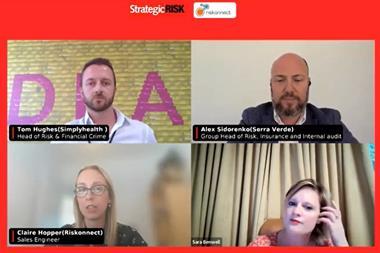One could argue that it is the ultimate strategic risk, the strategic risk to match all strategic risks - namely a shortage of risk managers.
When looking ahead at all the new and emerging issues which could hit the bottom line or land companies in the dock, a talented risk manager is becoming a necessity. Yet companies, financial ones in particular, are finding that few are to be had and few have the necessary skills.
Banks and financial houses which have let employees, such as market risk managers, go because equities were flailing and cost cutting required, are now finding that increasing regulations and demands for accountability, coupled with increasingly specialised and multi-disciplinary risks, are leaving them exposed. The downturn in recruitment of the last few years is now over.
The new Basel Accord, known as Basel II, neatly illustrates how legislative changes can swiftly affect staffing needs. The Accord, approved by a committee of international bank regulators in Basel, Switzerland, will lead to a sweeping overhaul of bank capital rules, aimed at strengthening the world's financial system. It closely measures banks' exposures to risks, and is intended to prevent financial problems in one corner of the global economy from spreading. It strengthens the risk management aspect of the banks and modifies the definition of risk-weighted assets. Under Basel II, banks will have to take into account operational risk as well as the credit risk. It is expected to take effect among member countries - Belgium, Canada, France, Germany, Italy, Japan, Luxembourg, the Netherlands, Spain, Sweden, Switzerland, United Kingdom and United States - by the end of 2006
"Over the past decade, the landscape of the risk market has changed drastically," says Adrian Marples, a senior risk management consultant at Sheffield Haworth, a London-based executive search firm. "Risk management was previously seen, rather cynically perhaps, as purely a control function, or as an ivory tower where distant and remote risk managers rejected deals that they did not understand.
"But the collapse of Barings and the economic turmoil in Russia and the Far East during the 1990s have changed attitudes towards risk, as well as the dynamics of risk management. What's more, the recent growth of the hedge fund market has further expanded the need for competent risk professionals. Risk management today therefore requires highly skilled professionals who can play a proactive and vital role in the operation of a profitable financial services institution."
Specialists needed
The credit risk market has seen the most change from Basel II, with banks keen to boost their risk management staff to deal with the accord. But credit risk management involves very specialised skills, with the most specialised the most in demand. As equities failed in recent years, financial institutions increased the number of complex, exotic financial products they bought and sold. Candidates with hedge-fund experience, for example, are most in demand, with demand totally outstripping supply.
"Hiring managers are searching for credit risk candidates who can not only provide detailed analysis of the hedge funds themselves, but who can also conduct due diligence as well as approve transactions with hedge fund counterparties," continues Marples. "But due to the limited amount of information that hedge funds disclose, risk managing a bank/hedge fund relationship is tricky. It requires a skilled risk expert who understands hedge fund strategies and can protect the bank from taking unnecessary risks."
Basel II has also catapulted operational risk into the spotlights. Its promise that banks could be allowed to set their own operational risk capital has made operational risk management a potential source of competitive advantage and a strategic consideration. In the past, banks would turn to internal auditors and consultants to handle operational risk issues; now they are looking for staff with direct experience of operations risk, as well as academic and industry qualifications relating to risk.
It has also meant that employers are looking for 'softer' skills in their potential employees. For example, when risk managers are attempting to build and maintain relationships with the front office, interpersonal and networking skills are seen as of increasing importance. While risk management is not necessarily a business filled with client interaction, it does require interaction with people. In addition, perception and funding of risk are largely dependent on the revenue-generating divisions of a bank. Risk managers need to understand that they are working with these divisions, and need to work well with them. This can mean tricky interventions on their behalf. If they do not think a deal offers an acceptable level of risk, they must say so and have suggestions for an alternative deal.
To plug the severe shortages gap, some banks have taken to pillaging their in-house teams, particularly their traders, for suitable risk management potential. But, while banks are the key risk management recruiters, they are no longer the only ones. IT companies, rating agencies, consultancies, insurers and asset managers are also on the look-out. All of which makes competition for those managers in the market the more intense. This is obviously great news for risk managers, who can pick and choose from a variety of jobs and, if they have the specialist skills, command salaries of up to £300,000 a year, but it is not great news for the banks. Furthermore, risk managers are demanding more recognition: for example, that they get credit for successful deals (and bonuses to accompany them) as well as, or instead of, the traders. Employers are having to be more creative with enticements, offering structured career progression and input into business strategy in order to make the role more challenging.
Double disadvantage
The Catch 22, however, is that the banks and companies most in need of risk managers are the least likely to attract them. "By their very nature, credit and risk professionals tend to be risk-averse when making important career decisions. They are programmed to ask questions and identify worst-case scenarios, so they tend to avoid putting themselves in risky situations," says Mark Sullivan of recruitment consultants Badenoch & Clarke. The fact that there are so few managers to go around just puts such organisations at a double disadvantage.
To date, however, head hunters say they have not noticed banks trying to plug the gap by offering specialised training to potential managers, so the problem is likely to continue, especially as there is no end in view to the stream of new legislation. The rhetoric is there, with all banks saying they are committed to training and education, and that human resources are a key concern. The evidence, however, is not. And now that economic conditions are improving, the skills shortages are the proof.
With not enough risk managers to go around, the only option seems to be to train up new talent. The alternative is that the institutions most in need of good risk management will find themselves unable to recruit.
That is a risk they cannot afford to take.
Corporate social responsibility (CSR) is another emerging risk. And as the list of multinationals whose reputations are ruined following a battering from environmental and social campaigners grows ever longer, it is clear that CSR is a risk that will not go away. Rather, is it developing its own new corporate standards, frameworks and laws.
And this risk is one which requires widely different skills from the traditional financial ones. Different companies have different CSR risk management needs. An oil or arms company, for example, is likely to have significantly more social and environmental risks to negotiate than, say, a publishing company.
The two roles are so distinct - with one requiring more traditional financial and analytical skills and the other requiring an understanding of social and environmental issues, and the mood in the campaigning lobbies - that it is unlikely that one person could fulfil both roles. As such, CSR is giving risk management-strapped companies an additional headache, and an additional salary to pay.
A plethora of postgraduate degrees in CSR have emerged in the past few years. They range from MBAs with a strong CSR focus, to degrees with a more public and voluntary sector focus. Graduates from these courses would be worthy of attention. Other solutions would be to outsource or buy-in CSR expertise on a needs-only basis.
However, if CSR campaigners have their way, the need for companies to measure, disclose and, ultimately, be financially and legally responsible for their social and environmental impact, will become the norm. It is still a long way off, but the first steps have already been taken with, for example, the UK's requirement that pension funds publish a statement of social and environmental intent.
THE BASEL COMMITTEE ON BANKING SUPERVISION
The committee was set up by the Central Banks of ten countries at the end of 1974. Members include Belgium, Canada, France, Germany, Italy, Japan, Luxembourg, the Netherlands, Spain, Sweden, Switzerland, the United Kingdom and the United States. Its role is to formulate broad supervisory standards and guidelines, and to recommend statements of best practice
An important objective is to try to ensure that no foreign banking establishment should escape supervision, and that supervision should be adequate.
The Basel capital accord was introduced in 1988. It provided for implementation of a credit risk measurement framework, with a minimum capital standard of 8%.
In June 1999, the committee issued a proposal for a new framework (Basel II) to replace the 1988 accord. The text is due to be published at the end of June 2004
The new accord will have three pillars: minimum capital requirements, supervisory review of an institution's internal assessment process, and effective use of disclosure
Further information from: www.bis.org



















